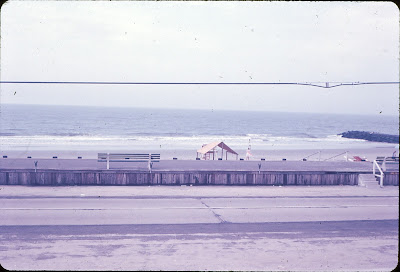During my teenage years in the 1970s, my family vacationed every summer in Cape May, New Jersey, a seaside resort at the southern tip of the state. With the Delaware Bay on one side of the peninsula and the Atlantic Ocean on the other, Cape May was all but surrounded by water. It was thus the perfect location for folks who loved the sea, as my family did.
My grandfather, Robert Burns, accompanied us on these excursions. When a friend in New York asked him once why he was going to Cape May, he replied, “to look at the ocean.” And that was a large part of what we did there. Of course, we did other things, too. We went swimming. We strolled along the boardwalk. We played mini golf. We sailed on the ferries to Delaware and back. But we spent a lot of time just looking at the ocean.
We stayed at the Coachman’s Motor Inn at 205 Beach Drive, directly across the street from the beach and the ocean. My grandfather and I frequently sat together in the canvas chairs on the second floor balcony that overlooked the beach and the water. From this vantage point we enjoyed an unobstructed view seaward. To my inexperienced and unenlightened teenage mind, it was simply a nice view. To my grandfather, however, it was so much more, and he often shared his observations and insights with me.
As a scientific man, my grandfather thought in patterns of observation, analysis, and conclusion. While watching the Atlantic from the Coachman’s balcony, he studied the conditions of the sea and sky with attention to the wave action, wind speed and direction, cloud cover, range of visibility, and air quality. He understood oceanography and meteorology, and as a former ocean traveler and recreational boater, he knew well the effects of the sea and sky on waterborne commerce. As he and I kept watch together, he often pointed out to me aspects of the surf, the play of the wind on the water, the formation of distant clouds, the longshore current, and the rise and fall of the tide. It was a wonderful educational experience for me. In retrospect, I wish I had written down all that he said. Such a collection of notes would now be a family heirloom.
In the years since these happy times in Cape May, I have spent countless hours in school, aboard ship, and ashore, studying the sea and sky. Of necessity, it became an important professional habit. A ship at sea is surrounded by two things, water and air, and the interaction of these elements determines the safety and comfort or the danger and discomfort of the voyage. I took meteorological observations for transmission to the National Weather Service. I analyzed the clarity of the horizon to assess the accuracy of navigational sights. I studied the cloud cover and compared it to the weather forecasts. I paid particular attention to the sea surface and noted patterns and changes in the wave and swell systems. All of this was for the safety of the ship and to estimate how rough or smooth the voyage would be.
Later in life, when visiting the oceanfront with Miss Patty and our children, I continued to observe and analyze the sea and sky in addition to enjoying and appreciating their tremendous natural beauty. Sometimes, however, I just sat there and stared at the ocean, content to simply enjoy it without undertaking a professional evaluation of everything. I can still do this for hours on end—it never grows tiresome—and I often wonder, how can anyone not like this? How can anyone not marvel at this?
Actually, many people do like and marvel at the sea. They find in it comfort, solace, and even a glimpse of Divinity. Something about the sea speaks to the human soul of higher and greater things, recalling for us the Lord’s words to Isaiah:
For as the heavens are higher than the earth,
so are my ways higher than your ways, and
my thoughts [higher] than your
thoughts (Isa. 55:9).
The supernal quality of the sea and the counsel of Isaiah remind us of our place in the cosmos and inspire us to raise our minds to a more sublime level. In so doing, we grow in knowledge, wisdom, and the Spirit. Thus, we become able to apprehend more than just a fleeting glimpse of Divinity when we gaze upon the sea.
Sometimes when I am staring at the ocean from a spot on the New England coast, I think of my family’s vacations in Cape May. If only it were possible to sit with my grandfather again and look seaward with him! No longer as an ignorant adolescent but as a seasoned merchant seaman would I speak with him. As we recounted experiences, shared insights, compared observations of the sea and sky, and analyzed recent oceanographic and meteorological discoveries, we would have so much to discuss! I’m certain that it would be a very long, pleasant, and inspirational conversation.
Next, let's look at some photographs:




















